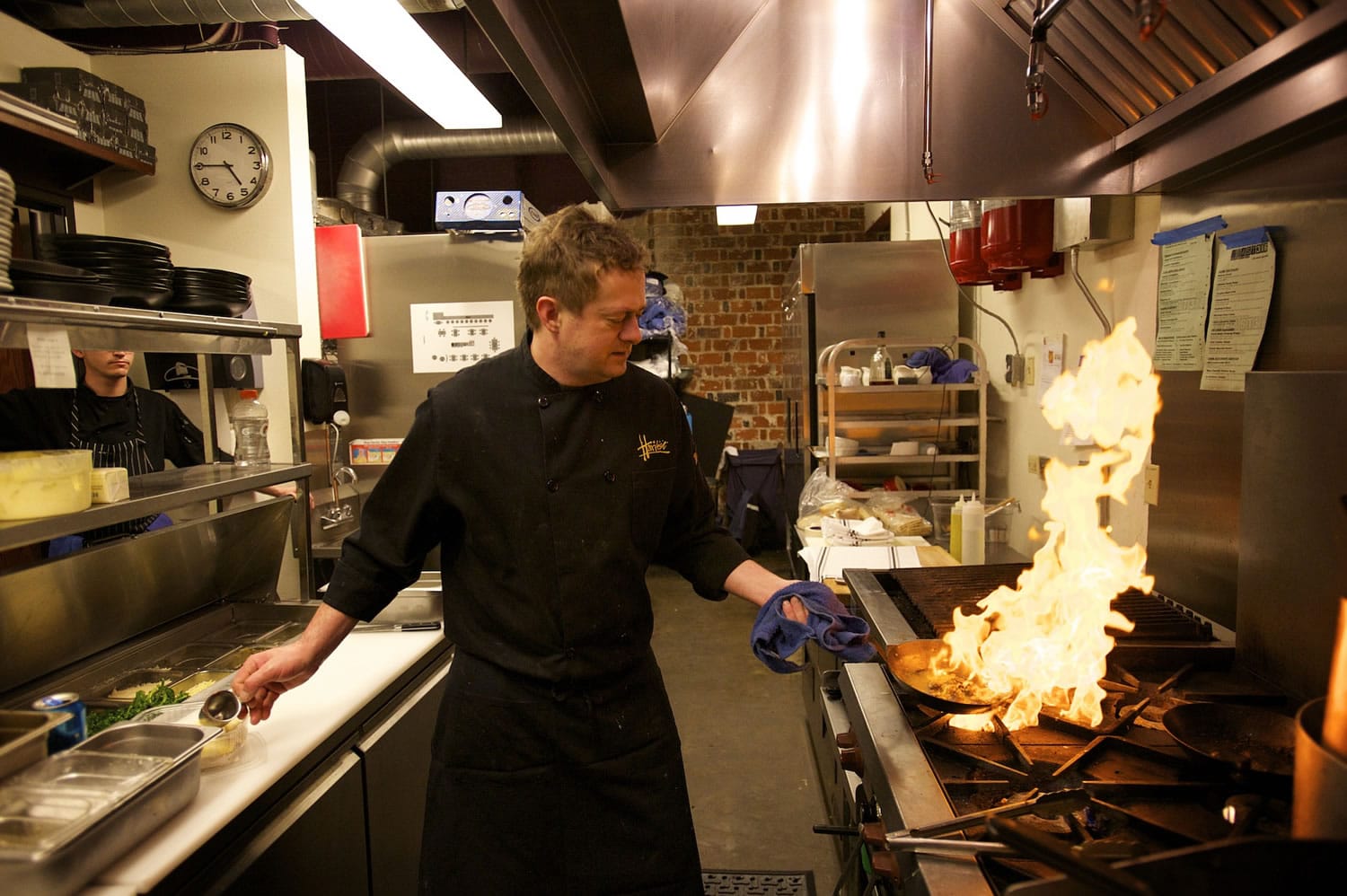Tim McCusker has been all around the world, but there’s a certain charm about downtown Camas that makes him feel at home.
“My dad says I have itchy feet,” said McCusker, the 42-year-old owner of Harvest on Fourth Avenue beneath the Camas Hotel. “What he means by that is America is my 27th country.”
McCusker grew up in Northern Ireland, working for his parents, who owned several pubs and hotels. After finishing school, he traveled Europe, bouncing around from one restaurant job to the next before moving to the United States.
Several years ago, he landed in Southwest Washington and eventually began running the show at Harvest. Now, McCusker is breathing new life into downtown Camas, bringing a touch of the city’s historic industrial past into his new steakhouse, Feast at 316, which opened last month.
Inside the restaurant, at 316 Northeast Dallas St., the walls are covered in bulky pieces used to make the machines Camas was built upon: decades-old wooden molds and other parts from the city’s 132-year-old paper mill. The dozens of massive pieces — some dating to the turn of the 20th century or earlier — have found new life as the decor of McCusker’s restaurant.
“Basically, what I tried to do is create a restaurant that belongs to Camas, not just some random steakhouse,” he said. “I get kind of bored with the places I go out to eat. The server doesn’t tell you cool, fun stuff about where you’re sitting.”
Complementing his celebration of local industry and history, McCusker has added a number of old items from Camas businesses, as well as other parts of Clark County.
Just inside the entrance, a small row of seats from the Liberty Theater have been repurposed into a waiting area. The seats date back several decades and were salvaged from the building before a fire ripped through the theater in 1994.
“I’m pretty sure they’re 70 or 80 years old,” McCusker said, pointing to the seats.
Attached to the wall above the theater seats are a couple of film reels from the theater.
This week, Ed Fischer, owner of Camas Bike & Sport, will put up a piece of wall art made from old bicycle parts behind the bar.
McCusker also built a shelf for wine glasses out of old wine boxes from a longtime Camas liquor store that recently closed. Some friends of McCusker’s at Lutz Hardware fire roasted the boxes, then stained them before putting them together at the end of his bar.
Even the bar itself has local roots going way back. The top is a polished 25-foot-long slab of wood from a Douglas fir in Battle Ground, and the boards lining the base were stripped from an old barn in rural Clark County.
The place is an important showcase of Camas’ past and present, said Mayor Scott Higgins, who’s spent most of his life in the city.
“That’s a really neat place they’ve pulled off,” Higgins said. “When I was in school, everybody’s parents, in one way or another, were connected to the mill.”
Nowadays, that’s no longer the case for Camas, as the local economy has diversified over the years with the rise of high-tech industry jobs in the small city.
“It is kind of exciting, because you see Camas changing all around,” Higgins said. “It’s exciting to see newer people coming there, seeing how important that (mill) was to us.”
McCusker came to Camas with a background in restaurant building. And when he began his latest project, he wondered how best to capture the history and culture of Camas’ quaint downtown streets.
Immediately, the mill came to mind, McCusker said, and he began planning the industrial-inspired interior design of Feast at 316.
The LaCamas Colony Co. opened the mill in 1883 at the west end of what would later become Camas’ historic downtown. Henry Pittock, who owned The Oregonian newspaper at the time, liked the site for its proximity to water.
Since then, the hulking mill has traded hands. Now,owned by Georgia Pacific, the mill remains among the city’s largest employers despite staffing cuts in recent years.
Poring over his options, McCusker contacted the mill and stumbled upon Anna Fry, a longtime millworker who has become a collector of old paper mill machinery and wooden molds used to make replacement parts. Fry’s connection to the equipment goes back more than 25 years, when she worked on the factory floor.
After spending years just sitting in a warehouse, the dusty old molds were donated to the Downtown Camas Association, which sold them to raise money for its work in the community. Fry and her husband decided the antique machinery belonged in Camas, so they purchased a large collection of it.
Since then, Fry has sold much of her collection from a booth at Camas Antiques, also on Fourth Avenue. A number of other businesses are becoming more interested in incorporating the old mill relics into their decor, she said.




